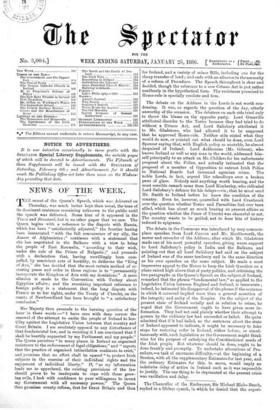The debate in the Commons was introduced by very common-
place speeches from Lord Curzon and Mr. Houldsworth, the mover and seconder of the Address, after which Mr. Gladstone made one of his most powerful speeches, giving warm support to Lord Salisbury's policy in India and the Balkans, and pointing out that all Lord Salisbury had said on the subject of Ireland was of the same tendency and in the same direction as his own speeches on the same subject. He made a most impressive appeal to the House to keep the Irish Question on a plane raised high above that of party politics, and criticising the two paragraphs in the Queen's Speech on the subject of Ireland, remarked that the phrase "fundamental law," as applied to the Legislative Union between England and Ireland, is inaccurate ; indeed, he intimated his disapproval of the phrase if the sentence in which it occurred implied more than a general assertion of the integrity and unity of the Empire. On the subject of the present state of Ireland socially and in relation to crime, he urged that the Government ought to have given more in- formation. They had not said plainly whether their attempt to govern by the ordinary law had succeeded or failed. He quite admitted that if it had failed, as the sentences about the state of Ireland appeared to indicate, it might be necessary to take steps for restoring order in Ireland, either before, or simul- taneously with, such legislation as the Government might think wise for the purpose of satisfying the Constitutional needs of the Irish people. But whatever should be done, ought to be done frankly and promptly. To undertake alterations of Pro- cedure,—a task of enormous difficulty,—at the beginning of a Session, with all the supplementary Estimates for last year, and the ordinary Estimates for this, to move, would imply an indefinite delay of action in Ireland such as it was impossible to justify. The one thing to be deprecated at the present crisis was vacillation and delay.


































